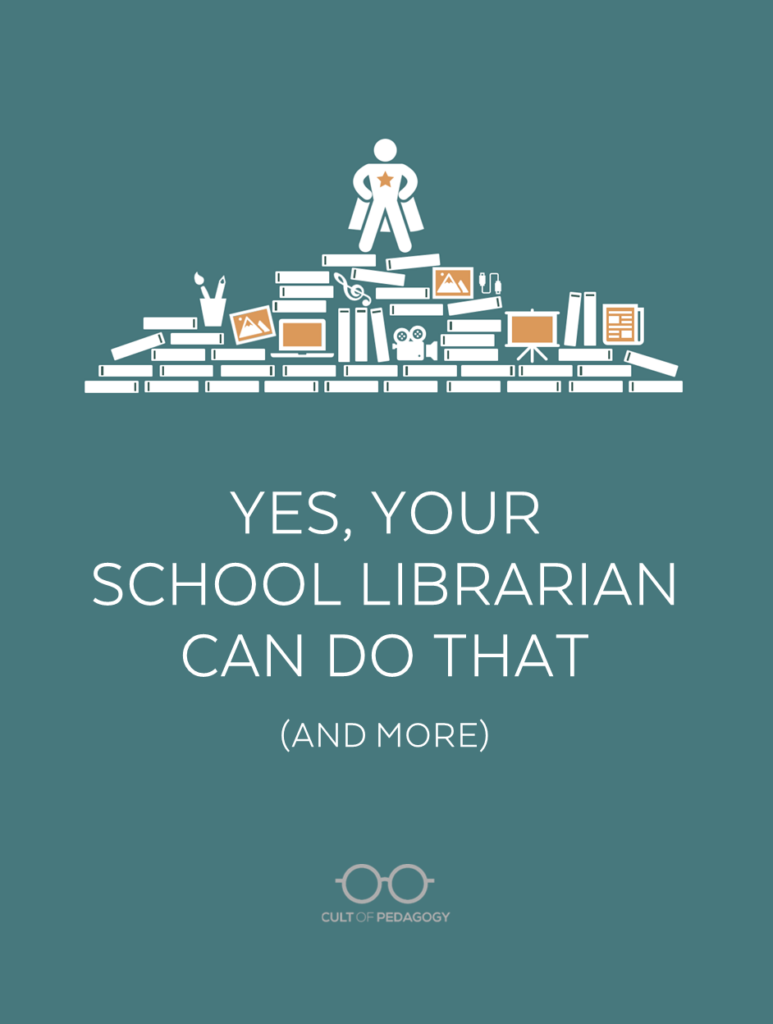
Listen to the interview with Karina Quilantan-Garza, Lauren Mobley,
K.C. Boyd, and Barbara Paciotti (transcript):
Sponsored by WeVideo and The Modern Classrooms Project
I used to think librarians did three things: (1) organize and fiercely protect large collections of books, (2) check those books out to visitors, and (3) shush people. As libraries started to house more technology, I added a fourth role: manage and protect the tech. That was about it.
But over the last ten years, whenever I set out to find information about teaching strategies, educational resources, technology for schools, or pretty much anything related to improving learning for our students, someone would inevitably pipe up and say, “Librarians can also help with that.”
And now that I’ve finally taken the time to learn more, I realize I had no idea just how many things librarians can do for classroom teachers. If your school is lucky enough to have a full-time certified librarian, it’s likely they are not being utilized to their full capacity. In fact, your school may be one of a growing number of schools that are eliminating librarians altogether, and that is a mistake.
On the podcast, I set out to explore all the ways a certified school librarian can make teachers’ work easier, more efficient, and more effective, and to make a strong case for why every school needs one.
To help me, I invited four accomplished librarians to help me: the first three are K.C. Boyd, Karina Quilantan-Garza, and Lauren Mobley, all current librarians who have been nationally recognized for their public work to advance the cause of librarians. The fourth is Barbara Paciotti, a retired librarian with over a decade of experience who now works for me, curating my content on Pinterest and keeping a sharp eye on all of my past work to make sure it stays accurate and useful. If there is anyone whose voice has been most persistently in my ear about making more space for librarians on Cult of Pedagogy, it’s Barbara’s.
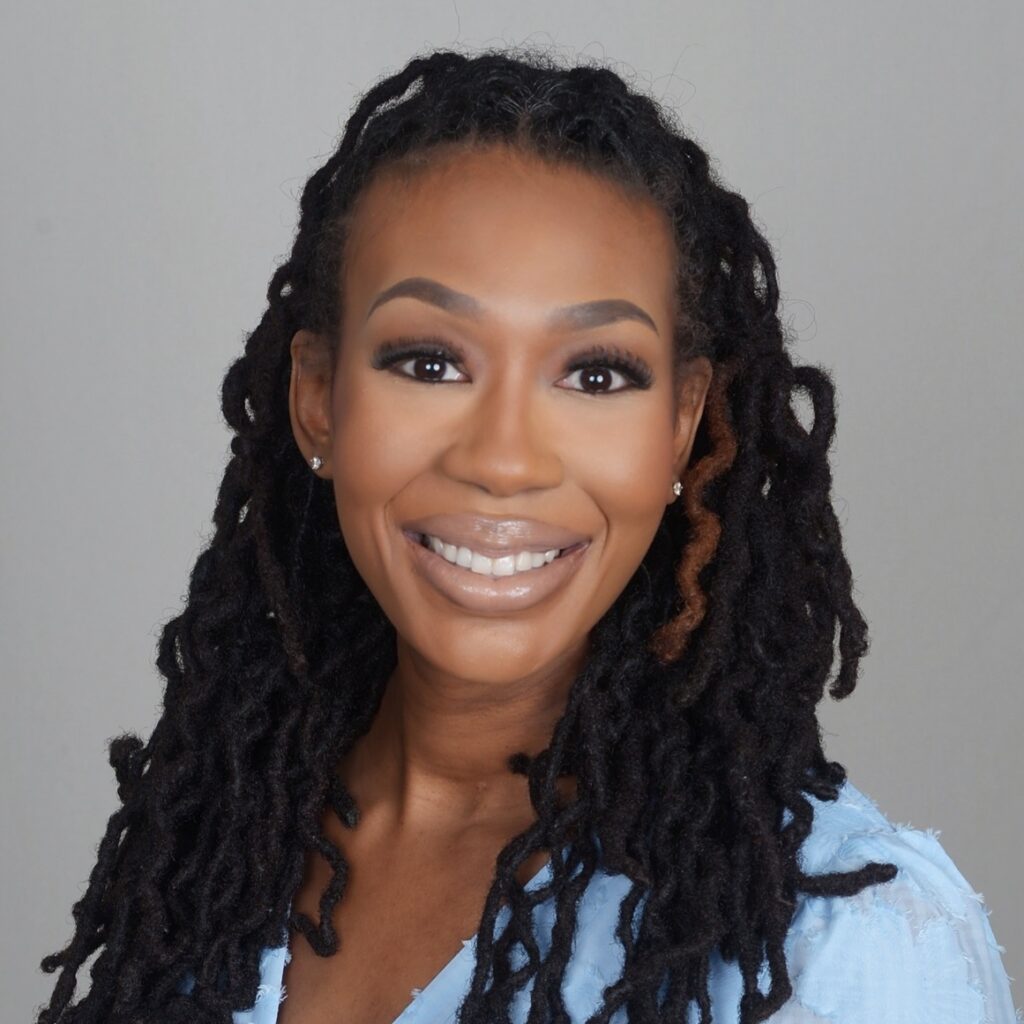
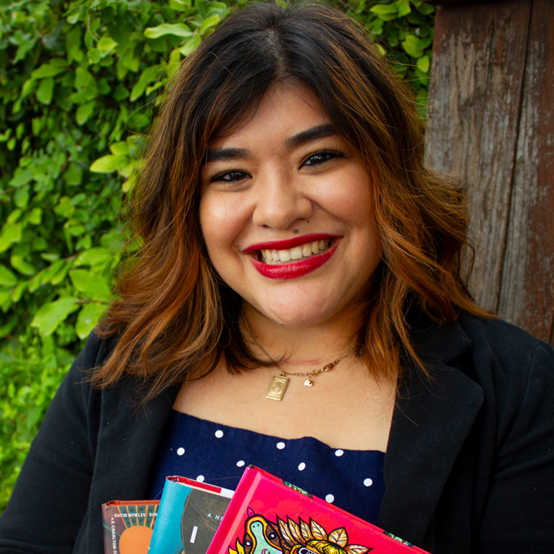

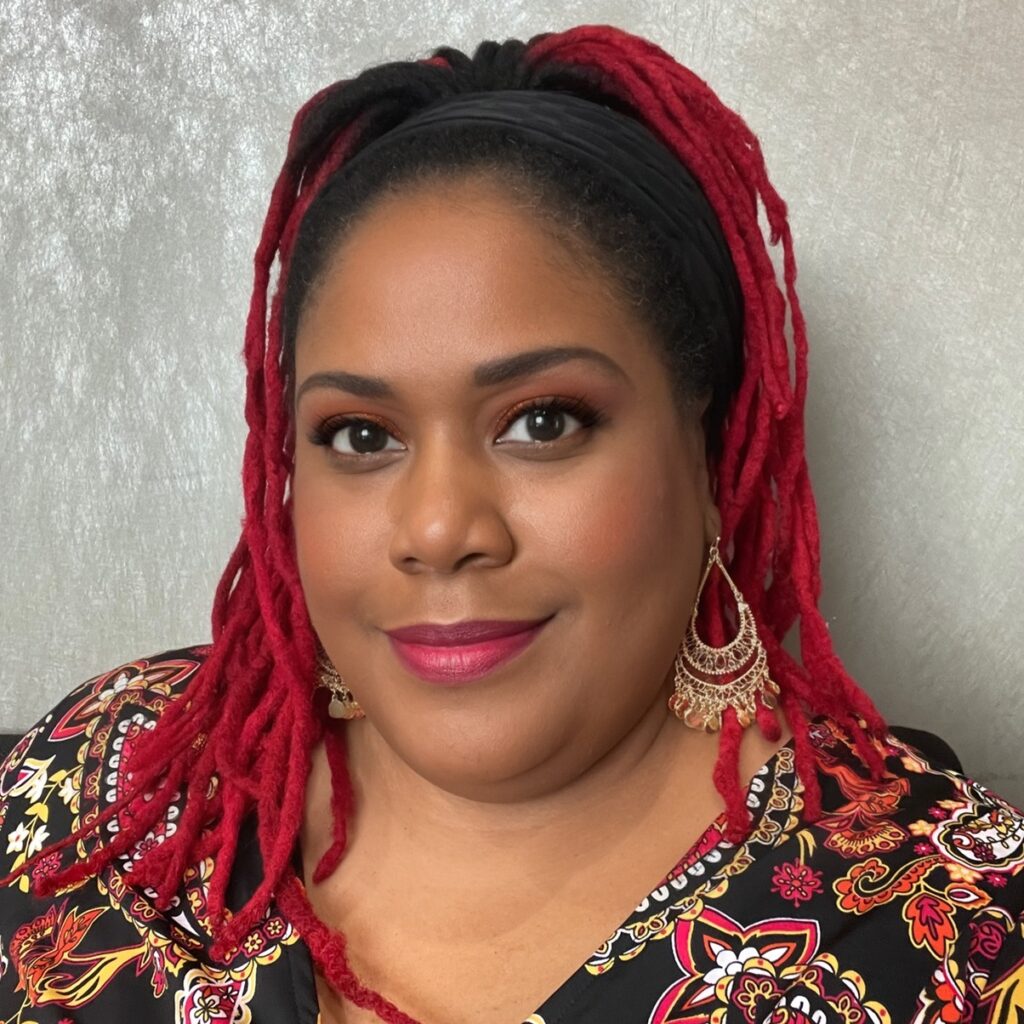
You can listen to our conversation in the player above, access the full transcript here, or read a sample of what we talked about below.
What are some things librarians can do that teachers may not know about?
While librarians are still responsible for curating collections of great books and promoting reading throughout the school, most are trained to do so much more. Teachers who take advantage of their librarians’ skills and knowledge can save themselves a lot of time.
Tech Support
Librarians are often trained in media resources, which includes most of the instructional technology used in the building. When teachers need help learning how to use a particular app or want recommendations for tools, the school librarian can usually be counted on to guide them in the right direction.
“Oftentimes my colleagues just think all I know is just the books and print materials,” Boyd says. “And then they kind of look at me like, whoa, you know how to get the SMART board running. You know how to use iPads and link all of the apps and build websites and use Canvas.”
“Especially now in the era of AI,” Quilantan-Garza adds, “we’re usually the first line of defense, not just to learn the tool but also to evaluate the tool.”
Instructional Planning
If you’re planning a new unit of instruction and seeking some fresh ideas, your school librarian can not only help you pull together the resources you need to enrich the unit, they may also be able to plan the whole lesson with you. “Most school librarians were actually teachers for a while before they became librarians,” Paciotti points out.
“We’re trained in so many different areas and across different subjects,” Quilantan-Garza says. “We’re not just helping the ELA classes, which is often a huge misconception. We know a lot about mathematic tools and apps and different databases for social studies.”
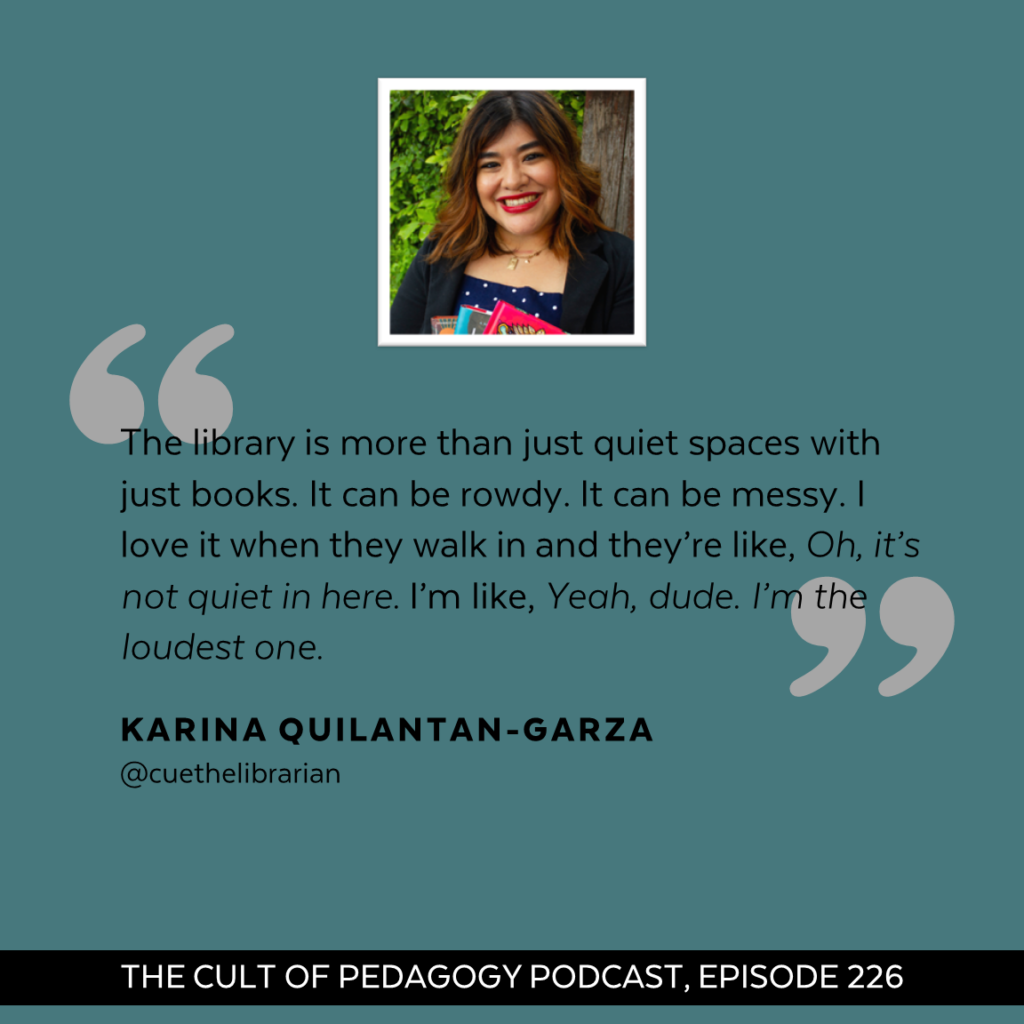
“If they’re ever stumped and it’s like, How do I approach this? or I need an idea,” Mobley says, “they can always come to the school librarian and get ideas for their class or some type of lesson that will enhance their instruction by making the lesson more engaging or fun and of course, hitting all those standards.”
They can also help you orchestrate lessons that take place in the library itself. Quilantan-Garza likes to plan collaborative, cross-curricular projects that meet multiple standards in different content areas, an idea that is sometimes met with resistance from teachers who feel pressured to cover as much state-tested content as possible in their own classrooms. “Library lessons can be a line to what they’re teaching … I’m trying to target all these different skills all at once, and they don’t know that until they experience it. The library is more than just quiet spaces with just books. It can be rowdy, it can be messy … I love it when they walk in, they’re like, ‘Oh my God, it’s not quiet in here.’ I’m like, ‘Yeah, dude. I am the loudest one.'”
Research Partnerships
When you assign a project to students that requires research, you don’t have to navigate it all on your own. Your school librarian is a gold mine of information that can help students get that research done right. “Teachers don’t realize how important it is that we can do that,” Paciotti says.
To help get the word out about what she could offer in this regard, Paciotti would hold teacher orientations at the beginning of the school year. “I send out invitations, and I customize parts of the library for different subject areas by displaying resources that we have and putting catalogs for additional resources that they can look through and suggest items to purchase.” These orientations also gave teachers hands-on practice with the databases available for student research, so they would be aware of what resources the school had on hand.
Social Emotional Support
Mobley has witnessed how her library meets more than just academic needs — for students and teachers. “Students come there to feel seen, to feel welcome, to feel safe, to get their fix of books, to talk to friends, but teachers may not realize that the library is also a safe space for them. I have a lot of teachers who will come, and they just want to take a second to sit down or maybe they want to vent to me. If they need to get away and take a minute, they’re welcome to do that too. It’s a space where everybody is welcome.”
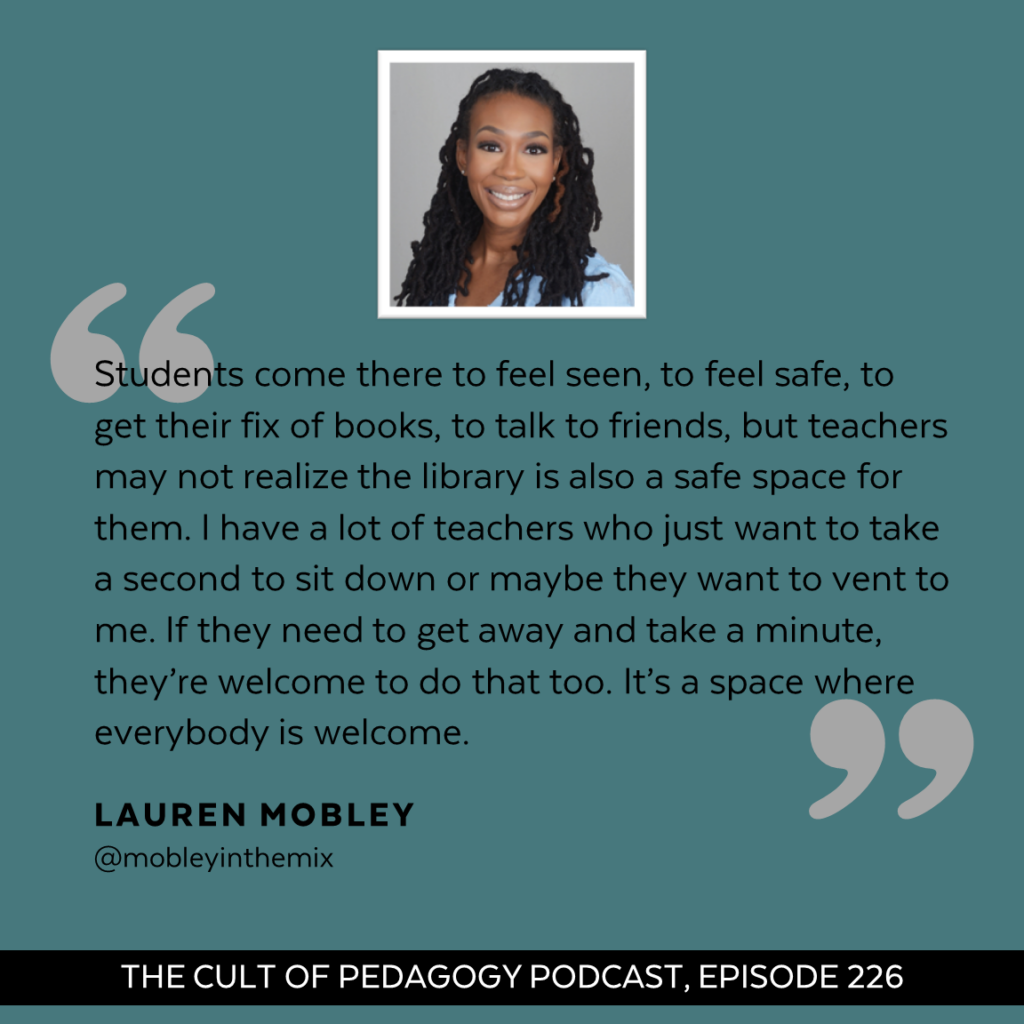
In Boyd’s experience, libraries can help students feel at home. “Working 25 years in a school library,” she says, “I have seen lives that have been impacted and changed for the better. I’ve had a number of kids that have come through my doors that come from different backgrounds, beliefs, cultures, religions. They come through the doors, and they feel welcomed and affirmed. They feel safe, and they feel that their voice can be heard. And we don’t have many spaces in the school where all that comes together.”
School librarian positions are being cut more than ever before. Why?
There has been a trend in recent years of schools eliminating librarian positions. Paciotti cites statistics from a research project called SLIDE (The School Librarian Investigation — Decline or Evolution?), which is studying patterns in the national decline in school librarian positions. According to their findings, a growing number of schools do not have a librarian at all, and many of those schools are in high-poverty, non-white districts.
This video summarizes some of their most significant findings.
Understanding why this is happening on a large scale is more complex than simply measuring the numbers, but our panel has had direct experience with these cuts, many of which stemmed from a lack of understanding of librarians’ value.
Swapping Librarians for Packaged Programs
In Boyd’s large urban district, decisions about allocation of funds are often made by people who do not have a background in education. In the face of low test scores, their response was to cut librarians in favor of packaged programs and expensive consultants.
“We had an individual that led a pledge to say librarians aren’t needed,” she explains. “We’re trying to cut the budget. We’re trying to raise scores. We’re going to enact a lot of reading-based automation programs — a computer essentially — to really get the kids reading. And especially in the Black and Brown neighborhoods, we’re going to close down the library programs. That’s what happened in my district now going on four years ago.”
Boyd believes these decisions reveal a lack of knowledge about what a good librarian can offer a school. “If they were to look at some (similar) districts that are thriving, that have school librarians, they wouldn’t make some of those decisions. But they don’t want to because they’re determined to bring in programming or experts — very large fees to pay these people to come in and do consulting. From my experience of 25 years, I haven’t really benefited from a tremendous amount of consultants. They’re in, they’re out, one or two years and that’s it.”
Replacing Librarians with Clerks
Other districts are not eliminating certified librarians entirely, but instead replacing them with clerks who have no formal training in library science. “They’re a support staff person,” Paciotti explains. “They bring them in to merely check out books. I am on about a dozen different Facebook groups (for school librarians). So many of these ladies and gentlemen are coming on saying, ‘Please help me. Please help me. I don’t know what to do.’ They have the best intentions, but they have had no training. Most of them aren’t even teachers. So they’ve been thrust into this position because administration does not understand what the value that a school librarian brings.”
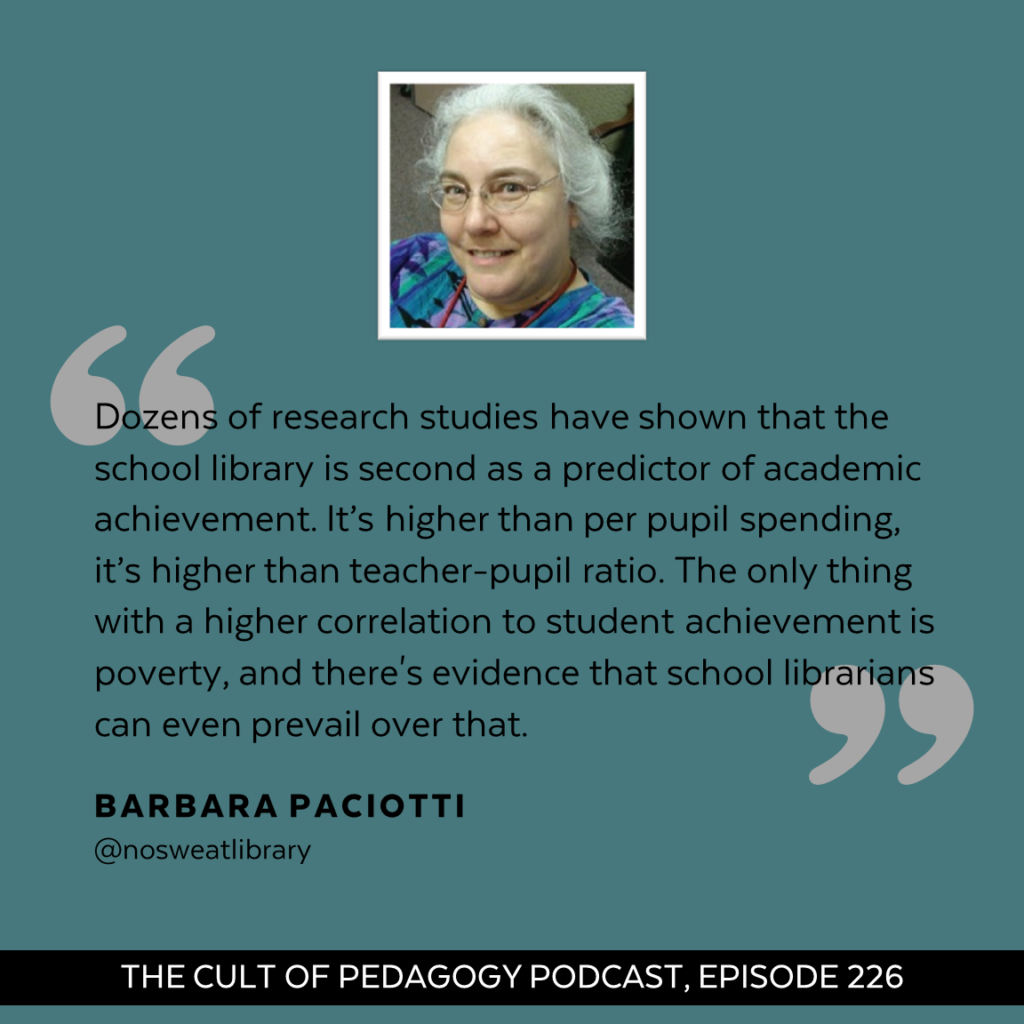
This trend, Paciotti fears, could ultimately shift perceptions of what a good librarian can do. “The more often this kind of thing happens, the less likely teachers in that building are going to be to understand and learn what a librarian can do for them and the less likely that librarian will be replaced. That’s one of the things the SLIDE report brought out — of the librarians who have been lost, none of them have been replaced. We are sending a whole generation of kids to college with absolutely no background in libraries or research.”
Repurposing Libraries for Test Prep
“In Houston just recently they made their library centers detention centers,” Quilantan-Garza says. “They said it was to increase reading scores. How that makes sense, I have no idea. Even as a parent, I can’t imagine seeing my kid go to his library and see nothing but desks in rows instead of a librarian doing read-alouds and working with Ozobots and helping teachers. It takes the spirit out of what we call the heart of the school. There’s a lot of emphasis on standardized testing and schools prioritize testing resources and staffing towards the subjects that are directly tested. And it marginalizes the support for library programs and librarians.”
How Can Educators, Parents, and Others Advocate for Librarians?
Get Involved at the Local Level
Boyd urges people to use existing channels for public comment to make their voices heard. “Go to your school board meeting and ask the questions. Why has the library program been closed? Why don’t we have a certified librarian? What measures are you taking to find certified librarians? Why is it that this librarian is working on multiple campuses within the district?”
While she says the answers to these questions probably won’t be satisfactory, the point is to put pressure on districts and let them know librarians are important. “Be a nuisance. That’s what I say.”
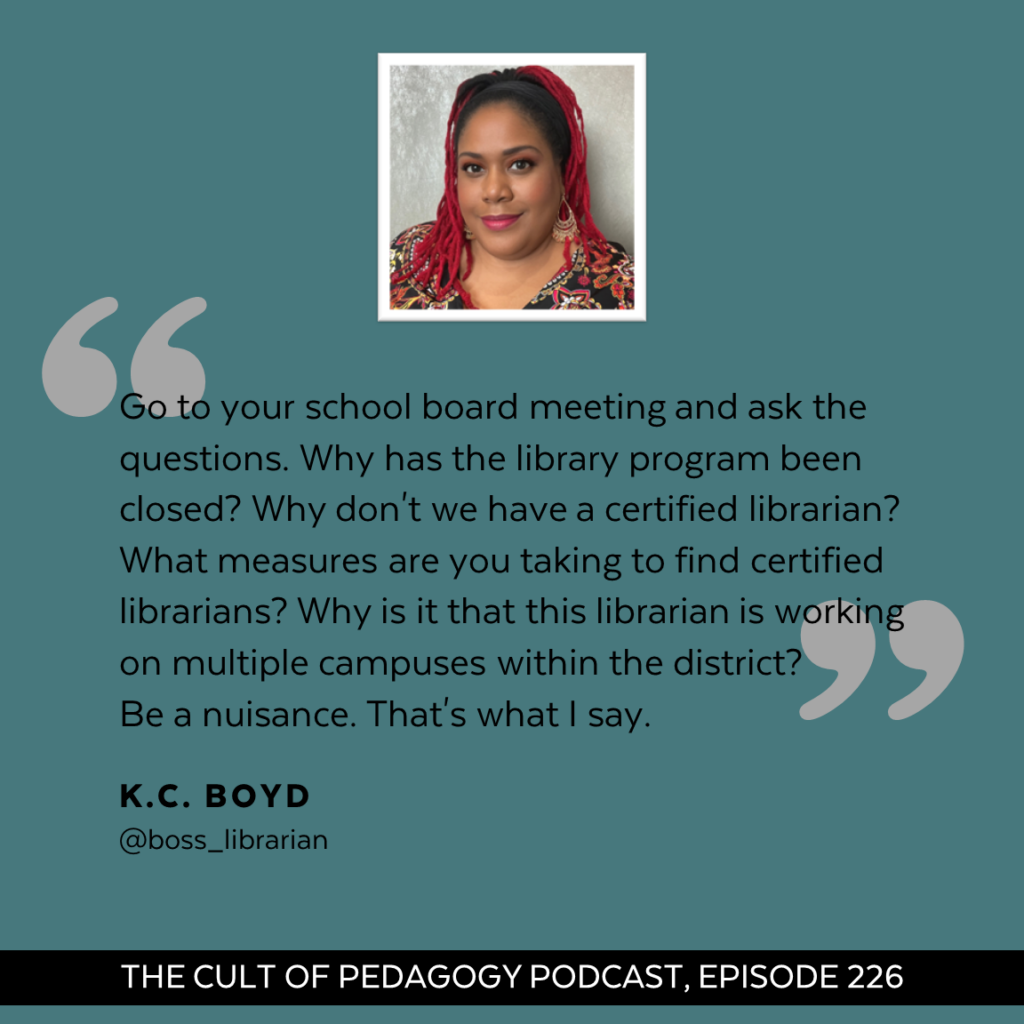
Support Organizations that Advocate for Librarians
Anyone who wants to help reverse the downsizing of school librarian positions can offer support to organizations that are already doing this work on a large scale. You can help them by learning about what they do, sharing their resources with your networks, giving donations, or volunteering.
- The American Association of School Librarians has an Advocacy Toolkit packed with information and links to tools that can help you advocate for school librarians.
- EveryLibrary, which builds support for libraries and helps Americans fight book bans, and their affiliate Save School Librarians, which focuses solely on supporting school librarians across the U.S.
Get the Data
When advocating for school librarians, it can help to have real numbers that back up how important they are.
“Dozens of research studies have shown that the school library is second as a predictor of academic achievement,” Paciotti says. “It’s higher than per pupil spending, it’s higher than teacher-pupil ratio. The only thing that has a higher correlation to student achievement is poverty, and there’s evidence that school librarians can even prevail over poverty.”
As for the Librarians Themselves…
While this conversation was started to raise awareness of the value of librarians among all educators, we also talked about things librarians can do to fortify their own profession.
- Find strength in numbers, networking with other librarians through support groups and organizations that advocate for librarians
- Look for opportunities to give teachers more professional development about what librarians can offer.
- Do your own PR within your school or through social media to spread the word that libraries are more than what people might think.
Quilantan-Garza puts it this way: “What we’re trying to do is promote a new generation of well celebrated and beautifully crafted library programs that engage not just the students but teachers and reach the overall community. There’s nothing like the experience that they’ll get in a place where it encourages community engagement and equitable access to the resources that they don’t just need but that they deserve.”
Join our mailing list and get weekly tips, tools, and inspiration that will make your teaching more effective and fun. You’ll get access to our members-only library of free downloads, including 20 Ways to Cut Your Grading Time in Half, the e-booklet that has helped thousands of teachers save time on grading. Over 50,000 teachers have already joined—come on in.





Hello! As a future school librarian hearing from this group has been inspiring! Love the practical knowledge and ideas, Anna
So glad the conversation was helpful for you, Anna! Best of luck on your journey toward school librarianship!
Great conversation, thank you! The link to the AASL Toolkits is no longer active. The new link is: https://www.ala.org/aasl/advocacy/tools/toolkits
Anne, thank you for bringing this to our attention! We will get that link updated in the post.
Thank you so much for this podcast, for listening to Barbara, for sharing your awakening to the power of adequately and professionally staffed school libraries, and especially for using your platform to highlight school librarians. We need all hands on deck in schools, and it’s a shame when so many of the willing and able hands on deck go wholly or partly unused. Students deserve and need certified school librarians, and teachers do, too!
I wholeheartedly agree, Gretchen. School librarians are essential! So glad the post resonated with you.